PHYSIOLOGY OF SPECIAL SENSES
1/54
There's no tags or description
Looks like no tags are added yet.
Name | Mastery | Learn | Test | Matching | Spaced | Call with Kai |
|---|
No analytics yet
Send a link to your students to track their progress
55 Terms
General and Special
What are the two types of senses?
General Senses
senses for touch, pressure, stretch, heat, cold, and pain
body
Receptors for general senses are located throughout the __________.
Special Senses
senses for taste, smell, hearing, equilibrium, and vision
head
Special sense organs are located in the _________.
Visual Acuity Test
test that measures the ability of the lens to focus light reflected from an object to the retina
Hyperopia
condition of farsightedness diagnosed through Visual Acuity Test
myopia
condition of nearsightedness diagnosed through Visual Acuity Test
presbyopia
condition that has difficulty to focus on close objects which is diagnosed through Visual Acuity Test
Snellen Eye Chart
eye testing chart used by eye care professionals to measure visual acuity
Demonstration of Blind Spot
figure (x or dot) disappears when it is focused on the blind spot which lacks photoreceptors
After Image
sensation that tends to persist in the consciousness after the cessation of stimulation
Positive After Image
after image that appears in the same color as the original stimulus
Negative After Image
after image that appears in color complementary to the original stimulus
Astigmatism
caused by abnormal lens or corneal curvature which causes part of the image to appear blurred
dark and distinct
TEST FOR ASTIGMATISM:
There is no astigmatism if all the radiating lines appear equally __________________.
blurred
TEST FOR ASTIGMATISM:
There is some degree of astigmatism if some of the lines are _________________ and appear less dark than the others.
Ishihara
what is used to test for colorblindness?
temporal lobe
The ear transmits sound vibrations and their patterns, intensities, and directions of origin to the ________________________ of the brain.
frequency (wavelength)
CHARACTERISTICS OF SOUND WAVES:
determines pitch measures in cycles per second (cps) or Hertz (Hz)
Amplitude (Intensity)
CHARACTERISTICS OF SOUND WAVES:
determines loudness measured in decibel (dB)
Weber Test
test in which a tuning fork is used to test for hearing loss
Unilateral
hearing loss is in one ear
bilateral
hearing loss is in both ears
Conduction Deafness
TYPES OF HEARING IMPAIRMENT:
caused by something that stops sounds from getting through the outer or middle ear
can be treated with medicine or surgery
Sensorineural (Perceptive) Deafness
TYPES OF HEARING IMPAIRMENT:
occurs when there is a problem in the way the inner ear or hearing nerve works
Central Deafness
TYPES OF HEARING IMPAIRMENT:
results from the defects in the central nervous system (auditory cortex) rather than in the ear itself or the auditory nerve
joints and muscles, eyes, and inner ear
3 sensory receptors that are involved in balance
Static Equilibrium
TYPES OF EQUILIBRIUM:
evaluates position of head relative to gravity (head is motionless)
macula
part of the body associated with static equilibrium
Dynamic Equilibrium
TYPES OF EQUILIBRIUM:
evaluates changes in direction and rate of head movement
semicircular canals
part of the body associated with dynamic equilibrium
papillae
The tongue which is covered in _______ is the principal organ of taste.
Taste Bud
located in the trenches of the papillae are sensitive to substances dissolved in water
Taste
senses that are a result of the stimulation of sensory neurons by chemical substance
Salty
5 TASTES:
stimulated by metallic ions
Sour
5 TASTES:
stimulated by hydrogen ions
Sweet
5 TASTES:
stimulated by hydroxyl ions
Bitter
5 TASTES:
stimulated by alkaloids
Umami
5 TASTES:
stimulated by glutamate (MSG or monosodium glutamate)
tip and anterior
GUSTATORY TESTS:
NaCl — salty at ______________ part of the tongue
lateral
GUSTATORY TESTS:
Acetic Acid — sour at the ________ side of the tongue
tip
GUSTATORY TESTS:
Sucrose — sweet at the _____ of the tongue
posterior part or base
GUSTATORY TESTS:
Quinine Sulfate —- bitter at the ____________________ of tongue
Solutions
GUSTATORY TESTS:
______ are perceived very rapidly
Crystals
GUSTATORY TESTS:
________ are perceived after several minutes due to longer dissolution time
Bitter
A.
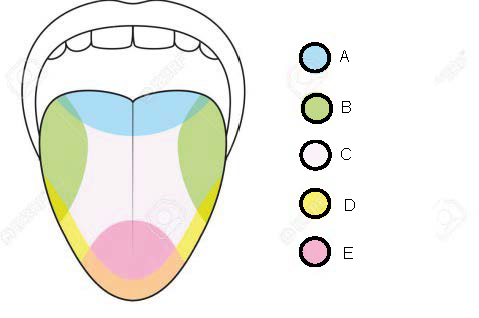
Sour
B.
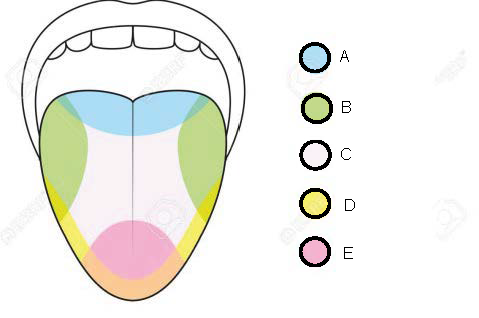
Umami
C.
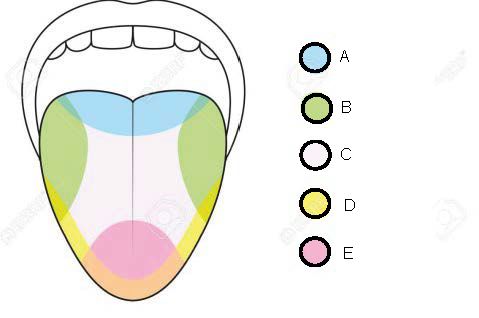
Salty
D.
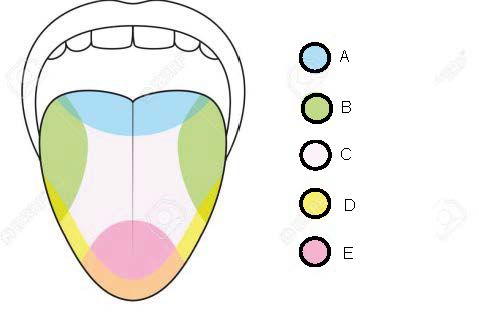
Sweet
E.
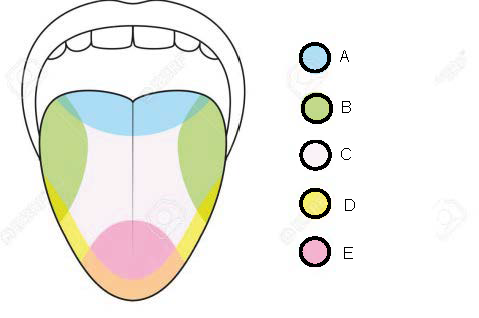
adaptation
The sense of smell has 2 outstanding characteristics:
Has a high degree of a._________________
certain odors b.______ others
a = ?
mask
The sense of smell has 2 outstanding characteristics:
Has a high degree of a._________________
certain odors b.______ others
b = ?
Masking
ability of a high intensity odor to dominate and exclude any other odors
Smell
receptors that are excited by chemical substances in the air